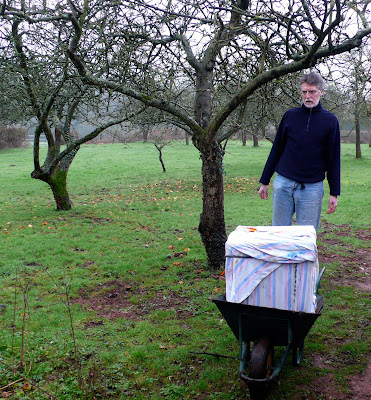 We were promised a sunny day today. The sun shone - for ten minutes! Oh, February is a miserable month.
We were promised a sunny day today. The sun shone - for ten minutes! Oh, February is a miserable month.I don't seem to have been anywhere for ages. I've got cabin fever, so tomorrow we are taking a long weekend break and going for a catch-up with family and to visit a few galleries, first to Cambridge and then on to London.
 Spring is coming, but it is so cold and damp that gardening is unpleasant. I know that after just a few days away I'll be happy to come back home to see what is growing.
Spring is coming, but it is so cold and damp that gardening is unpleasant. I know that after just a few days away I'll be happy to come back home to see what is growing.
 There are buds forming on the pear tree. If you look at the branches you will also see that they are covered in lichen, a sign of clean air, but also a good indication of how much wet weather we have had to endure.
There are buds forming on the pear tree. If you look at the branches you will also see that they are covered in lichen, a sign of clean air, but also a good indication of how much wet weather we have had to endure.
 Spring is coming, but it is so cold and damp that gardening is unpleasant. I know that after just a few days away I'll be happy to come back home to see what is growing.
Spring is coming, but it is so cold and damp that gardening is unpleasant. I know that after just a few days away I'll be happy to come back home to see what is growing.The fruit trees are underplanted with 'St Patrick's Day' daffodils and their leaves are just starting to push up through the ground.
St Patrick's Day is on the seventeenth of March but unless the weather improves considerably I doubt that we shall be seeing a host of golden anything.
 There are buds forming on the pear tree. If you look at the branches you will also see that they are covered in lichen, a sign of clean air, but also a good indication of how much wet weather we have had to endure.
There are buds forming on the pear tree. If you look at the branches you will also see that they are covered in lichen, a sign of clean air, but also a good indication of how much wet weather we have had to endure.Yesterday we went on a shopping trip to a garden centre to collect various things to take to London to replenish our daughter's small terrace garden. We bought a bag of compost, not a big one - it has to be carried up three flights of stairs!
While I was poking around I found some half barrels suitable to use as water butts outside the greenhouse. The young man who helped me manhandle the butts said that they had been used for storing whisky and that when they first come into the store they smell wonderful!
One is already in place, with enough rainfall overnight to almost fill it.

















































